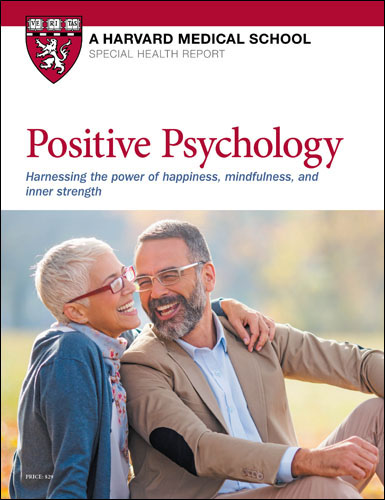Learning to right a wrong
Forgiving yourself for past actions is a powerful healing tool.
 You may still struggle at times when you think about how someone mistreated you. But what about when you were in the wrong?
You may still struggle at times when you think about how someone mistreated you. But what about when you were in the wrong?
It's not unusual to revisit memories of when you bullied someone, wronged a person at work, or insensitively broke off a relationship with a friend or family member.
"This can occur more often as people age and suffer personal loss or setbacks," says Richard Cowden, a social-personality psychologist with the Human Flourishing Program at Harvard's Institute for Quantitative Social Science. "They begin to have regrets. But when these memories arise, it's usually a sign you need to work through those feelings and not push them down. They may affect you in ways you don't realize, and this is a chance to address your past mistakes and finally move on by forgiving yourself."
Change is good
The challenge many men face with self-forgiveness is the misconception that it is a sign of weakness. But it actually takes courage. "Forgiving yourself can culminate in self-growth," says Cowden. "So, when things come back that we regret having done, we can approach it as an opportunity to learn about ourselves and grow in beneficial ways."
Practicing self-forgiveness can have a range of health benefits. Studies have shown that self-forgiveness is associated with reductions in guilt, shame, stress, depression, anxiety, and substance abuse, as well as greater self-esteem and life satisfaction.
"We are often harder on ourselves than on others," he says. "But once you can forgive yourself and break away from self-punishment, you can begin the process of healing and positive behavior change."
The four R's of forgiveness
There are four parts to the self-forgiveness process: responsibility, remorse, reorientation, and renewal. Here are some ways to approach each one.
Responsibility. Facing what you have done is often the most challenging part of self-forgiveness. "It's uncomfortable to admit you've done something wrong, and it's natural to protect one's self-esteem by dismissing what happened or making excuses for your behavior," says Cowden.
What you can do: Write a letter. Using pen and paper or a computer keyboard, outline your errors and acknowledge your misgivings. "You don't have to send it to the person," says Cowden. "Just the act of expressing yourself and writing it down can help you process your emotions about your past behavior."
Remorse. Once you take responsibility for your past, you may experience negative feelings, such as shame and guilt. "This is normal, so don't bottle them up," says Cowden.
What you can do: Talk it out. Always remember that you are not alone, and others struggle with similar issues. "Sharing these feelings with a trusted friend could you help you work through them and gain valuable insight, and you often can return the favor," says Cowden.
Reorientation. One of the most crucial parts of self-forgiveness is to make amends (if that is possible) and to try your best not to transgress again in the same way.
What you can do: Apologize. Apologize if it's called for (or send that letter, if that's easier). Use expressions of regret like "I wish I could take it back," or "I wish I had been more thoughtful." Another approach is to ask the person what you can do to make amends. If you can't communicate with the person, have an imaginary conversation with him or her, or share your apology with someone you both know. "This exercise can help you commit not to engage in the same behavior in the future," says Cowden.
Renewal. This is the self-healing stage where you let go of what you did wrong and move forward with the lessons you've learned.
What you can do: Reconnect with your spiritual side. If you follow a religious or spiritual practice, have thought about it, or are looking to return to a lapsed practice, this is an opportunity to explore self-forgiveness through prayer or meditation. "This often facilitates internal reflection, which can help you realize that everyone makes mistakes and that you are not beyond repair," says Cowden.
Self-forgiveness is not easy and may take time and extra effort, but it's worth it, adds Cowden. "It can free you from your past mistakes and help you live more fully in the here and now. You might be surprised how much better you feel if you can work through the process of forgiving yourself."
Image: © franckreporter/Getty Images
About the Author

Matthew Solan, Executive Editor, Harvard Men's Health Watch
Disclaimer:
As a service to our readers, Harvard Health Publishing provides access to our library of archived content. Please note the date of last review or update on all articles.
No content on this site, regardless of date, should ever be used as a substitute for direct medical advice from your doctor or other qualified clinician.
















